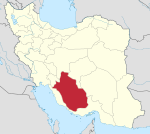Madar-e-Soleyman
Madar-e Soleyman
Persian: مادر سليمان | |
|---|---|
City | |
| Coordinates: 30°11′28″N 53°10′31″E / 30.19111°N 53.17528°E[1] | |
| Country | Iran |
| Province | Fars |
| County | Pasargad |
| District | Pasargad |
| Population (2016)[2] | |
| • Total | 1,546 |
| Time zone | UTC+3:30 (IRST) |
Madar-e Soleyman (Persian: مادرسليمان)[a] is a city in, and the capital of, Pasargad District[b] of Pasargad County, Fars province, Iran. It also serves as the administrative center for Madar-e Soleyman Rural District.[5] The name means "mother of Solomon," the Biblical Bathsheba, from the tomb historically reputed to belong to her (known as the Tomb of Cyrus in modern times).[citation needed]
Demographics
[edit]Population
[edit]At the time of the 2006 National Census, Madar-e Soleyman's population was 1,633 in 404 households, when it was a village in Madar-e Soleyman Rural District.[6] The following census in 2011 counted 1,822 people in 513 households.[7] The 2016 census measured the population as 1,546 people in 452 households,[2] by which time the village had been elevated to the status of a city.[8]
See also
[edit]Notes
[edit]References
[edit]- ^ OpenStreetMap contributors (9 October 2024). "Madar-e Soleyman, Pasargad County" (Map). OpenStreetMap (in Persian). Retrieved 9 October 2024.
- ^ a b Census of the Islamic Republic of Iran, 1395 (2016): Fars Province. amar.org.ir (Report) (in Persian). The Statistical Center of Iran. Archived from the original (Excel) on 6 April 2022. Retrieved 19 December 2022.
- ^ Madar Soleyman can be found at GEOnet Names Server, at this link, by opening the Advanced Search box, entering "-3073325" in the "Unique Feature Id" form, and clicking on "Search Database".
- ^ Davodi, Parviz (c. 2023) [Approved 1 October 1387]. Changing the name of Hakhamanish District under Pasargad County in Fars province to Pasargad District. qavanin.ir (Report) (in Persian). Ministry of the Interior, Political and Defense Commission. Proposal 79826/42/1/4. Archived from the original on 28 September 2023. Retrieved 28 September 2023 – via Laws and Regulations Portal of the Islamic Republic of Iran.
- ^ Aref, Mohammad Reza (c. 2021) [Approved 29 January 1384]. Divisional reforms in Fars province (Mashhad Morghab District, Madar-e Soleyman District, Abu ol Verdi District, Hakhamanish District, Pasargad County). qavanin.ir (Report) (in Persian). Ministry of the Interior, Political-Defense Commission of the Government Board. Proposal 50878/42/1/4/1; Notification 58538/T26118H. Archived from the original on 9 October 2021. Retrieved 10 December 2023 – via Laws and Regulations Portal of the Islamic Republic of Iran.
- ^ Census of the Islamic Republic of Iran, 1385 (2006): Fars Province. amar.org.ir (Report) (in Persian). The Statistical Center of Iran. Archived from the original (Excel) on 20 September 2011. Retrieved 25 September 2022.
- ^ Census of the Islamic Republic of Iran, 1390 (2011): Fars Province. irandataportal.syr.edu (Report) (in Persian). The Statistical Center of Iran. Archived from the original (Excel) on 16 January 2023. Retrieved 19 December 2022 – via Iran Data Portal, Syracuse University.
- ^ Rahimi, Mohammad Reza (c. 2023) [Approved 17 October 1391]. Approval letter regarding country divisions in Fars province regarding the villages of Mazayjan, Baba Monir, Soltanabad, and Madar-e Soleyman. lamtakam.com (Report) (in Persian). Ministry of the Interior, Council of Ministers. Proposals 42/1/92501, 4/1/42/96946, 118058/4/1/42, and 4/1/42/136792; Notification 202890/T47288K. Archived from the original on 9 December 2023. Retrieved 9 December 2023 – via Lam ta Kam.


